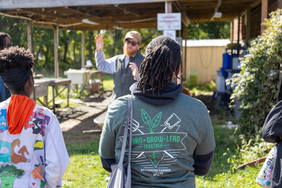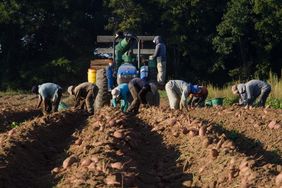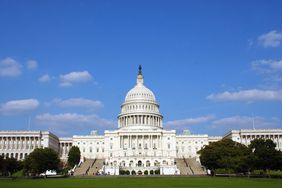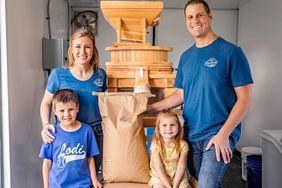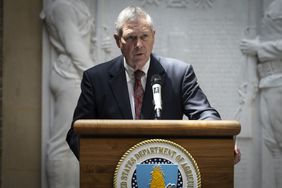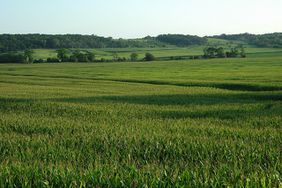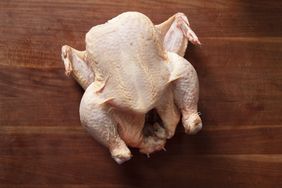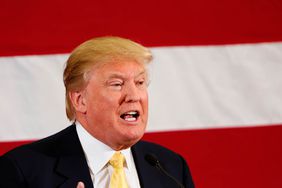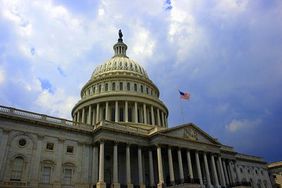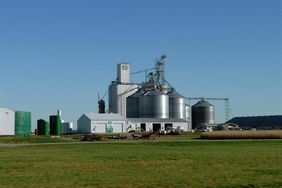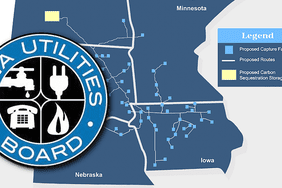:max_bytes(150000):strip_icc()/agri-pulse-panel-2-2000-a8c14dda1de64e909f2ae100c0827fe2.jpg)
If the rhetoric about agricultural trade is making you nervous, it's time to buckle up your seat belt. You might want to add shoulder harnesses, as well.
That was the overall message from a panel of agricultural industry leaders at the Agri-Pulse "Harvesting Perspectives" summit in Washington, D.C., on Wednesday, March 20. Across the board, panelists admitted how uncomfortable they were with the rhetoric coming from the White House and President Trump, and the anxiety it is creating with trading partners across the globe.
Trump's comments have "made us nervous," said Zippy Duvall, president of the American Farm Bureau Federation. The current climate on ag trade is "a rough, rough roller-coaster ride. You better cinch up the seatbelt tight," Duvall said.
"The style of this administration makes us nervous," agreed Chuck Conner, the president and CEO of the National Council of Farmer Cooperatives. "We all have to admit that. There are problems out there" on trade, Conner said, and the administration is determined to address them. But, he agreed, "There is some risk in that."
"Words do matter," said Darci Vetter, an international trade consultant and a former deputy undersecretary of agriculture at USDA from 2010 to 2014. Vetter also worked as an international trade adviser for the Senate Finance Committee. "The vocabulary does matter," and it changed throughout the 2016 election. Vetter said that the current climate, described as a battle pitting "winners and losers," doesn't help build a long-term relationship of trade agreements that are mutually beneficial.
"Words have consequences," said Roger Johnson of the National Farmers Union. Johnson said he didn't agree with the administration's rhetoric – what he described as "whiplash and uncertainty generated by the president" – but Johnson agrees that Trump's real issue is the trade deficit. "I agree with the president: the deficit does matter."
What is the solution for the frayed nerves in agriculture? The panelists agreed that patience, and a shared voice, will win the day for farmers and ranchers.
There are five or six key groups that are leading the agricultural dialogue with the administration, according to Duvall, and having a consistent message will impact the president, the entire administration, to know the impact of agriculture. "Trade is so important to agriculture," Duvall said. Trump's demeanor, although unsettling, is familiar to Duvall, who raises cattle and poultry on his Georgia operation. "I still deal with my farm," he said. "I deal with people like President Trump on my farm." Trump is "a businessman. He does business differently."
Despite the nerves, panelists agreed that the administration is engaged.
In previous administrations, according to Conner, "Usually it's tough to get the Oval Office's attention." He said that the current administration is "a very engaged administration, from the president on down."
Among the lively topics for the summit's discussion, the panel addressed key concerns on the minds of producers.
NAFTA
The renegotiation of NAFTA had everyone on the panel nervous but united.
Mitch Davis, of St. Peter, Minnesota, who currently manages over 19,000 animals (of which 8,700 are milked daily by 140 employees), was clear of his support of NAFTA, despite the depressed dairy industry. NAFTA "is the last thing we should try to uproot," Davis said. "NAFTA is not something they should be messing with." Davis said that the focus for global trade should be on building demand, rather than dealing with the Canadian dairy quotas.
Vetter agreed that the frayed nerves around NAFTA has a cost. "Uncertainty is costly," she said. "Industry needs certainty." Despite the success of NAFTA for the past 25 years, Vetter said "we have serious competitors that are willing to take our place," should the U.S. walk away from the agreement entirely.
TPP
Since the U.S. exited the Trans-Pacific Partnership agreement, the remaining 11 countries have continued to ratify and start to implement TPP. Has it hurt U.S. agriculture? Duvall said that leaving TPP cost the U.S. farm economy $4.4 billion – and the opportunity to do trade with the fastest growing part of the world.
Vetter, who negotiated parts of the TPP agreement under the Obama administration, said that the U.S. "loses influence" in the world by not being part of the pact. Other countries can fill the void created by the absence of U.S. ag products. She said the Trump administration has not stated what parts of the TPP agreement it disagrees with, and Duvall agreed.
Conner said that, with the U.S. on the sidelines, the rest of the world economies advance while the U.S. considers reentering the TPP. "The world doesn't stand still. Will we be let back into this process? I think we will." It's a dynamic world market and "does not turn on the winds of the U.S.," he added.
FARM COUNTRY SUPPORT
"This president is president because of this issue – trade," said Johnson of the NFU. It was rural America – farm country supporters – that believed in Trump's message and his stand on international trade. We should not forget that this voter bloc voted for Trump, Johnson said. "My bet is he won't forget it."
"People were sick and tired of the PC rhetoric and nothing was ever done or said," Davis added. "There are things Trump says that are refreshing to the average voter, and that's why he was elected to office."
The panelists agreed that, despite Trump's "bellicose" rhetoric, farm industry leaders know they need his help to grow demand across the globe for ag products. Duvall, addressing the president, said Trump "has made us nervous on trade. Ag products have to move across the world, so farm families can survive. Mr. Trump, they helped pave the way to the White House for you … We're expecting you to stand up and fight for us."

